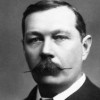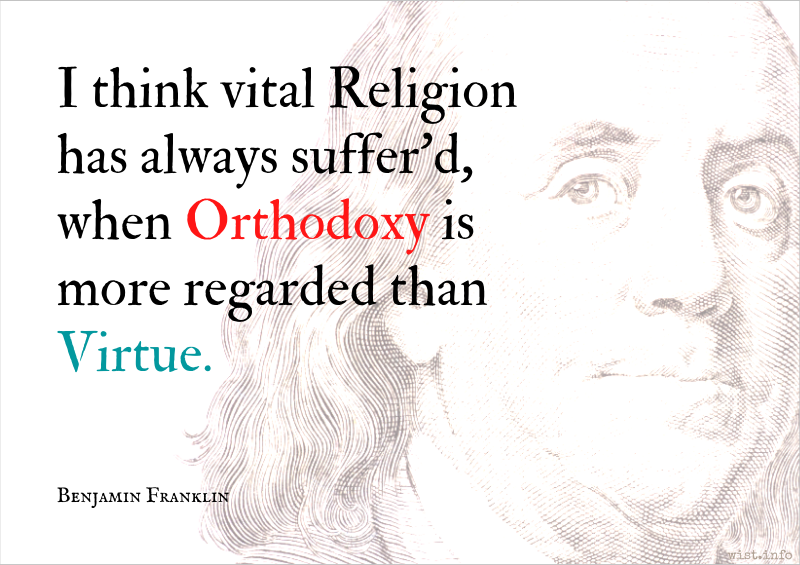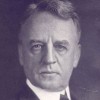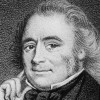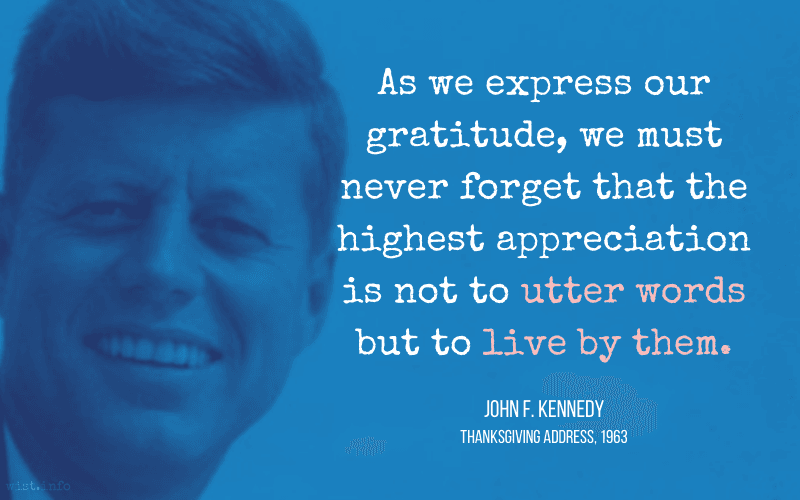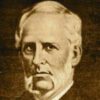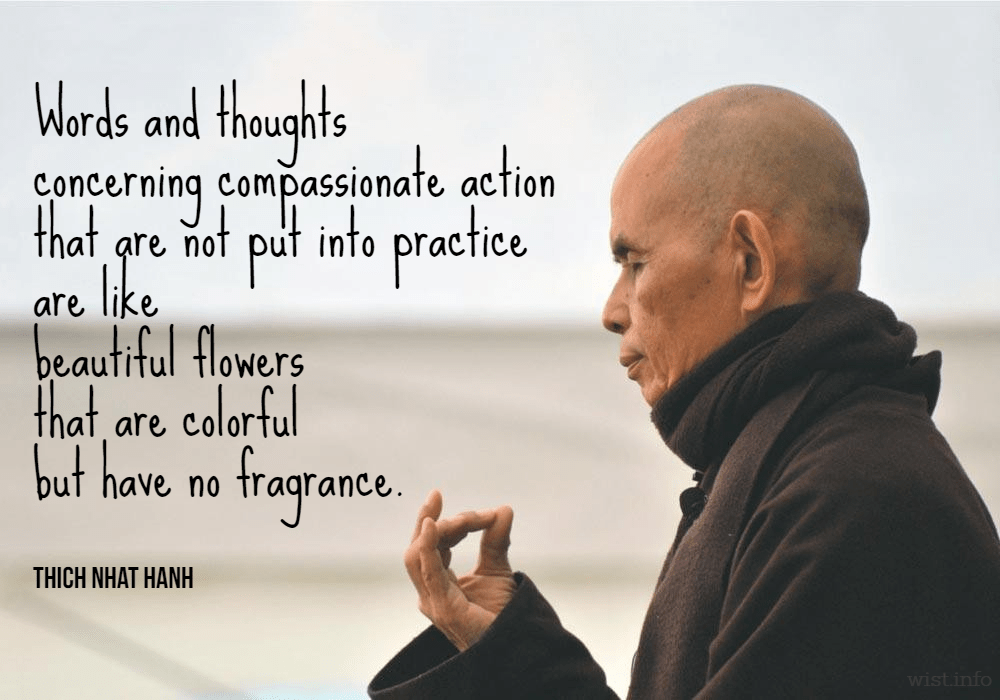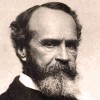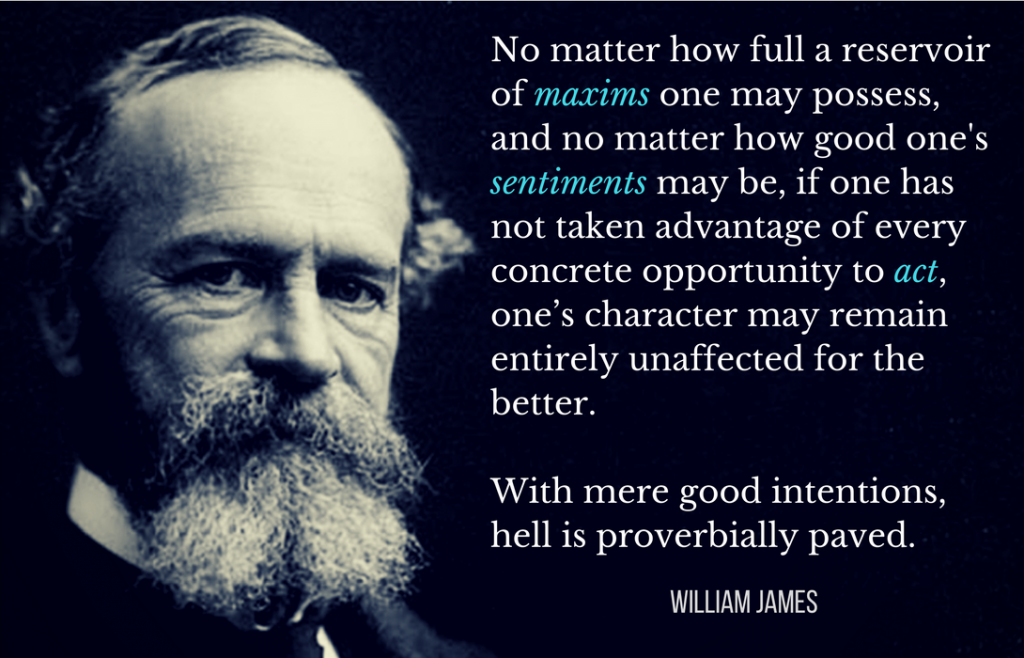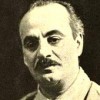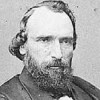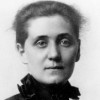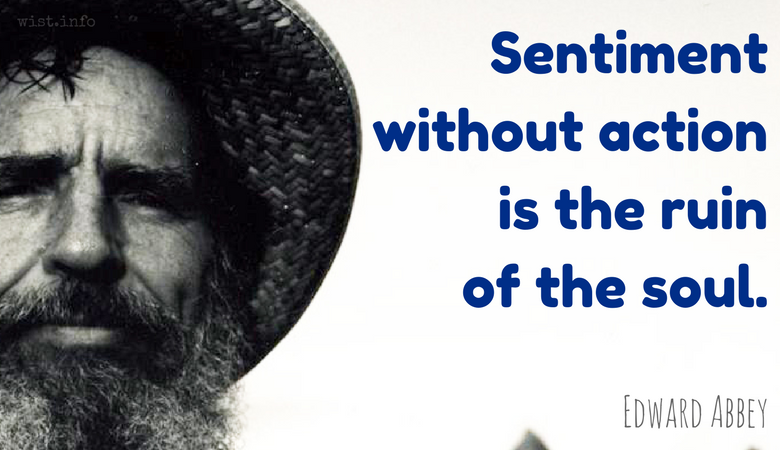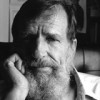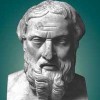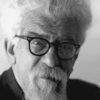The world would be much better off if the pains taken to analyze the subtlest moral laws were given to the practice of the simplest.
[Es stände besser um die Welt, wenn die Mühe, die man sich gibt, die subtilsten Moralgesetze auszuklüglen, zur Ausübung der einfachsten angewendet würde.]
Marie von Ebner-Eschenbach (1830-1916) Austrian writer
Aphorisms [Aphorismen], No. 104 (1880) [tr. Wister (1883)]
(Source)
(Source (German)). Alternate translation:
The world would be in better shape if people would take the same pains in the practice of the simplest moral laws as they exert in intellectualizing over the most subtle moral questions.
[tr. Scrase/Mieder (1994)]
Quotations about:
words and deeds
Note not all quotations have been tagged, so Search may find additional quotes on this topic.
A musician would not willingly consent that his lyre should be out of tune, nor a leader of a chorus that his chorus should not sing in the strictest possible harmony; but shall each individual person be at variance with himself, and shall he exhibit a life not at all in agreement with his words?
[εἶτα μουσικὸς μὲν οὐκ ἂν ἑκὼν δέξαιτο ἀνάρμοστον αὐτῷ τὴν λύραν εἶναι, καὶ χοροῦ κορυφαῖος μὴ ὅτι μάλιστα συνᾷάδοντα τὸν χορὸν ἔχειν” αὐτὸς δέ τίς ἕκαστος διαστασιάσει πρὸς ἑαυτόν, καὶ οὐχὶ τοῖς λόγοις ὁμολογοῦντα τὸν βίον παρέξεται.]
Basil of Caesarea (AD 330-378) Christian bishop, theologian, monasticist, Doctor of the Church [Saint Basil the Great, Ἅγιος Βασίλειος ὁ Μέγας]
Address to Young Men on Reading Greek Literature, ch. 6, sec. 4 [tr. Deferrari/McGuire (1933)]
(Source)
It iz a darned sight eazier tew find six men who kan tell exactly how a thing ought tew be did than tew find one who will do it.
[It is a darned sight easier to find six men who can tell exactly how a thing ought to be done than to find one who will do it.]
Josh Billings (1818-1885) American humorist, aphorist [pseud. of Henry Wheeler Shaw]
Everybody’s Friend, Or; Josh Billing’s Encyclopedia and Proverbial Philosophy of Wit and Humor, ch. 130 “Affurisms: Puddin & Milk” (1874)
(Source)
Altho’ thy Teacher act not as he preaches,
Yet ne’ertheless, if good, do what he teaches;
Good Counsel, failing Men may give; for why,
He that’s aground knows where the Shoal doth lie.
My old Friend Berryman, oft, when alive,
Taught others Thrift; himself could never thrive:
Thus like the Whetstone, many Men are wont
To sharpen others while themselves are blunt.Benjamin Franklin (1706-1790) American statesman, scientist, philosopher, aphorist
Poor Richard (1734 ed.)
(Source)
Nothing enlarges more the Gulf of Atheism, than that Μέγα Χάσμα, wide passage, which lies between the Faith and Lives of Men pretending to be Christians.
Edward Stillingfleet (1635-1699) British Christian theologian, polemicist, preacher, prelate
Origines Sacræ, “The Epistle Dedicatory” (1663)
(Source)
The last few days I have read various addresses made on Lincoln’s Birthday. Every Politician always talks about him, but none of them ever imitate him.
Goodness is about what you do. Not who you pray to.
I have no desire to make mysteries, but it is impossible at the moment of action to enter into long and complex explanations.
Arthur Conan Doyle (1859-1930) British writer and physician
“The Dancing Men” [Sherlock Holmes], The Strand Magazine (Dec 1903)
(Source)
Reprinted as "The Adventure of the Dancing Men" in The Return of Sherlock Holmes, ch. 3 (1905).
But merely to possess virtue as you would an art is not enough, unless you apply it. For an art, even if unused, can still be retained in the form of theoretical knowledge, but virtue depends entirely upon its use.
[Nec vero habere virtutem satis est quasi artem aliquam, nisi utare; etsi ars quidem, cum ea non utare, scientia tamen ipsa teneri potest, virtus in usu sui tota posita est.]
Marcus Tullius Cicero (106-43 BC) Roman orator, statesman, philosopher
De Re Publica [On the Republic, On the Commonwealth], Book 1, ch. 2 / sec. 2 (1.2) (54-51 BC) [tr. Sabine/Smith (1929)]
(Source)
(Source (Latin)). Alternate translations:
Yet to possess virtue, like some art, without exercising it, is insufficient. Art indeed, when not effective, is still comprehended in science. The efficacy of all virtue consists in its use.
[tr. Featherstonhaugh (1829)]
Nor is it sufficient to possess this virtue as if it were some kind of art, unless we put it in practice. An art, indeed, though not exercised, may still be retained in knowledge; but virtue consists wholly in its proper use and action.
[tr. Yonge (1853)]
It is not enough to possess virtue, as though it were an art, unless we use it. For although, if you do not practice an art, you may yet retain it theoretically, the whole of virtue is centered in the exercise of virtue.
[ed. Harbottle (1906)]
But it is not enough to possess virtue, as if it were an art of some sort, unless you make use of it. Though it is true that an art, even if you never use it, can still remain in your possession by the very fact of your knowledge of it, yet the existence of virtue depends entirely upon its use.
[tr. Keyes (1928)]
Yet it is not enough to possess moral excellence as a kind of skill, unless you put it into practice. You can have a skill simply by knowing how to practise it, even if you never do; whereas moral excellence is entirely a matter of practice.
[tr. Rudd (1998)]
Furthermore, virtue is not some kind of knowledge to be possessed without using it: even if the intellectual possession of knowledge can be maintained without use, virtue consists entirely in its employment.
[tr. Zetzel (1999)]
Truly it is not enough to have virtue, as if it wer some sort of art, unless you use it. In fact, even if an art can be grasped by knowledge itself without using it, virtue depends wholly upon its use.
[tr. Fott (2014)]
It is not enough simply to possess virtue, as though it were a skill, unless you use it. Even a skill can be maintained through disuse by knowledge itself, but the entirety of virtue consists of its use.
[tr. Robinson (2016)]
Sharing the food is to me more important than arguing about beliefs. Jesus, according to the gospels, thought so too.
Freeman Dyson (1923-2020) English-American theoretical physicist, mathematician, futurist
“Progress in Religion,” Templeton Prize acceptance speech, Washington National Cathedral (9 May 2000)
(Source)
A time-honored concept of Anglo-Saxon justice declares that a man is innocent until proven guilty. I believe that in a democratic society a man is similarly loyal until proven disloyal. No testaments of faith, no protestations of affection for his native land, and no amount of signatures will prove a bloody thing — one way or the other — as to a man’s patriotism or lack thereof.
Rod Serling (1924-1975) American screenwriter, playwright, television producer, narrator
Speech, Moorpark College, Moorpark, California (3 Dec 1968)
(Source)
Serling had refused to sign a loyalty oath before speaking, giving up the fee for his appearance.
To suffer the civil magistrate to intrude his powers into the field of opinion and to restrain the profession or propagation of principles, on the supposition of their ill tendency, is a dangerous fallacy, which at once destroys all religious liberty, because he being of course judge of that tendency, will make his opinions the rule of judgment, and approve or condemn the sentiments of others only as they shall square with or differ from his own.
Thomas Jefferson (1743-1826) American political philosopher, polymath, statesman, US President (1801-09)
“Virginia Statute for Religious Freedom,” Preamble (1776-06-18; enacted 1786-01-16)
(Source)
Don’t be a man of “Intentions.” The world gives a man credit only for his deeds and, often, not even for them.
Minna Antrim (1861-1950) American epigrammatist, writer
Don’ts for Bachelors and Old Maids (1908)
(Source)
O prince, in early youth divinely wise,
Born, the Ulysses of thy age to rise
If to the son the father’s worth descends,
O’er the wide wave success thy ways attends
To tread the walks of death he stood prepared;
And what he greatly thought, he nobly dared.[Τηλέμαχ᾽, οὐδ᾽ ὄπιθεν κακὸς ἔσσεαι οὐδ᾽ ἀνοήμων,
εἰ δή τοι σοῦ πατρὸς ἐνέστακται μένος ἠύ,
οἷος κεῖνος ἔην τελέσαι ἔργον τε ἔπος τε:
οὔ τοι ἔπειθ᾽ ἁλίη ὁδὸς ἔσσεται οὐδ᾽ ἀτέλεστος.]Homer (fl. 7th-8th C. BC) Greek author
The Odyssey [Ὀδύσσεια], Book 2, l. 271ff (2.271) (c. 700 BC) [tr. Pope (1725)]
(Source)
(Source (Greek)). Alternate translations:
Those Wooers well might know, Telemachus,
Thou wilt not ever weak and childish be,
If to thee be instill’d the faculty
Of mind and body that thy father grac’d;
And if, like him, there be in thee enchac’d
Virtue to give words works, and works their end.
This voyage, that to them thou didst commend,
Shall not so quickly, as they idly ween,
Be vain, or giv’n up, for their opposite spleen.
[tr. Chapman (1616)]
If in you you retain the spirit brave
Your father had, to make his word his deed,
Then also the assurance I shall have,
To tell you in your voyage you shall speed.
[tr. Hobbes (1675), l. 257ff]
Telemachus! thou shalt hereafter prove
Nor base, nor poor in talents. If, in truth,
Thou have received from heav’n thy father’s force
Instill’d into thee, and resemblest him
In promptness both of action and of speech,
Thy voyage shall not useless be, or vain.
[tr. Cowper (1792), l. 355ff]
Not base and foolish after all is done
Shalt thou be counted, if the brave old blood
hath from the sire descended to the son.
If thou like him both word and deed make good,
Then were thy journey all in vain withstood.
[tr. Worsley (1861), st. 37]
Tel'mac'! no craven wilt thou be nor dullard;
If but one drop of they sire's good blood be in thee,
Such as he was in feats of deed or word:
So will not be thy journey vain nor bootless!
[tr. Bigge-Wither (1869)]
Telemachus, even hereafter thou shalt not be craven or witless, if indeed thou hast a drop of thy father’s blood and a portion of his spirit; such an one was he to fulfil both word and work. Nor, if this be so, shall thy voyage be vain or unfulfilled.
[tr. Butcher/Lang (1879)]
Telemachus, now shalt thou be no foolish faintheart thing.
If of they father's good-heart in thee hath sprung the seed,
Such a man for the word well-spoken, and fulfilment of the deed,
Not in vain shall be thy faring, nor thy going forth be undone.
[tr. Morris (1887)]
Telemachus, henceforth you shall not be a base man nor a foolish, if in you stirs the brave soul of your father, and you like him can give effect to deed and word. Then shall this voyage not be vain and ineffective.
[tr. Palmer (1891)]
Telemachus, if you are made of the same stuff as your father you will be neither fool nor coward henceforward, for Ulysses never broke his word nor left his work half done. If, then, you take after him, your voyage will not be fruitless.
[tr. Butler (1898)]
Telemachus, neither hereafter shalt thou be a base man or a witless, if aught of thy father's goodly spirit has been instilled into thee, such a man was he to fulfil both deed and word. So then shall this journey of thine be neither vain nor unfulfilled.
[tr. Murray (1919)]
Telemachus, let not your courage and resource fail you now. In your father deed and word notably marched together to their deliberate end. If your body holds a trace of his temper it will suffice to make this effort of yours neither bootless nor aimless.
[tr. Lawrence (1932)]
Today has proved you, Telemachus, neither a coward nor a fool, nor destined to be such, if we are right in thinking that your father’s manly vigour has descended to his son -- and what a man he was in action and debate! No fear, then, that this journey of yours will end in farce or failure.
[tr. Rieu (1946)]
You'll never be fainthearted or a fool,
Telémakhos, if you have your father's spirit;
he finished what he cared to say,
and what he took in hand he brought to pass.
The sea routes will yield their distances
to his true son, Penélopê's true son.
[tr. Fitzgerald (1961)]
Telemachos, you are to be no thoughtless man, no coward,
if truly the strong force of your father is instilled in you;
such a man he was for accomplishing word and action.
Your journey then will be no vain thing nor go unaccomplished.
[tr. Lattimore (1965)]
Telemachus,
you'll lack neither courage nor sense from this day on,
not if your father's spirit courses through your veins --
now there was a man, I'd say, in words and action both!
So how can your journey end in shipwreck or defeat?
[tr. Fagles (1996)]
You won't turn out to be a fool or a coward,
Telemachus, not if any of Odysseus' spirit
Has been instilled in you. Now there was a man
Who made sure of his words and deeds! Don't worry,
You'll make this journey, and it won't be in vain.
[tr. Lombardo (2000), l. 293ff]
Telemachus, you will not in future prove cowardly or foolish if you have truly inherited your father's strong vigor -- and what a man he was for carrying out his word and deed -- and so your journey will surely not be unfulfilled or in vain.
[tr. Verity (2016)]
Telemachus, you will be brave and thoughtful, if your won father's forcefulness runs through you. How capable he was, in word and deed! Your journey will succeed, if you are his.
[tr. Wilson (2017)]
Telemachus,
in future days you will not be worthless
or a stupid man, if you have in you now
something of your father’s noble spirit.
He’s the sort of man who, in word and deed,
saw things to their conclusion. So for you
this trip will not be in vain or pointless.
[tr. Johnston (2019), l. 364ff]
But the many do not act upon this rule; they rather betake themselves to mere talk about what is right, deluding themselves into the belief that they are philosophers, and are consequently upon the high road to virtue; but, in reality, acting not unlike a sick man who listens attentively to his physicians, and then carries out none of their advice.
[ἀλλ᾽ οἱ πολλοὶ ταῦτα μὲν οὐ πράττουσιν, ἐπὶ δὲ τὸν λόγον καταφεύγοντες οἴονται φιλοσοφεῖν καὶ οὕτως ἔσεσθαι σπουδαῖοι, ὅμοιόν τι ποιοῦντες τοῖς κάμνουσιν, οἳ τῶν ἰατρῶν ἀκούουσι μὲν ἐπιμελῶς, ποιοῦσι δ᾽ οὐδὲν τῶν προσταττομένων. ὥσπερ οὖν οὐδ᾽ ἐκεῖνοι εὖ ἕξουσι τὸ σῶμα οὕτω θεραπευόμενοι, οὐδ᾽ οὗτοι τὴν ψυχὴν οὕτω φιλοσοφοῦντες.]
Aristotle (384-322 BC) Greek philosopher
Nicomachean Ethics [Ἠθικὰ Νικομάχεια], Book 2, ch. 4 (2.4, 1105b.12) (c. 325 BC) [tr. Williams (1869)]
(Source)
On practicing virtuous acts to become virtuous. (Source (Greek)). Alternate translations:
Yet people in general do not perform these actions, but taking refuge in talk they flatter themselves they are philosophising, and that they will so be good men: acting in truth very like those sick people who listen to the doctor with great attention but do nothing that he tells them.
[tr. Chase (1847), ch. 3]
But most people, instead of doing such actions, take refuge in theorizing; they imagine that they are philosophers and that philosophy will make them virtuous; in fact they behave like people who listen attentively to their doctors but never do anything that their doctors tell them.
[tr. Welldon (1892)]
But most men, instead of doing thus, fly to theories, and fancy that they are philosophizing and that this will make them good, like a sick man who listens attentively to what the doctor says and then disobeys all his orders.
[tr. Peters (1893)]
But most people do not do these, but take refuge in theory and think they are being philosophers and will become good in this way, behaving somewhat like patients who listen attentively to their doctors, but do none of the things they are ordered to do.
[tr. Ross (1908)]
But the mass of mankind, instead of doing virtuous acts, have recourse to discussing virtue, and fancy that they are pursuing philosophy and that this will make them good men. In so doing they act like invalids who listen carefully to what the doctor says, but entirely neglect to carry out his prescriptions.
[tr. Rackham (1934), ch. 4, sec. 6]
Ordinary people, however, do not do these actions but, taking refuge in argument, think that they are doing philosophy and that this is the way to become excellent -- thus behaving a bit like sick people who listen carefully to their doctors but do none of the things that are prescribed.
[tr. Reeve (1948)]
Yet most men do not do these; instead, they resort to merely talking about them and think that they are philosophizing and that by so doing they will become virtuous, thus behaving somewhat like patients who listen to their doctors attentively but do none of the things they are ordered to do.
[tr. Apostle (1975)]
This is not, however, the course that moes people follow: they have recourse to their principle, and imagine that they are being philosophical and that in this way they will become serious-minded -- behaving rather like invalids who listen carefully to their doctor, but carry out none of his instruction.
[tr. Thomson/Tredennick (1976)]
The many, however, do not do these actions but take refuge in arguments, thinking that they are doing philosophy, and that this is the way to become excellent people. In this they are like a sick person who listens attentively to the doctor, but acts on none of his instructions.
[tr. Irwin/Fine (1995)]
But the masses do not do them. They take refuge in argument, thinking that they are being philosophers and that this is the way to be good. they are rather like patients who listen carefully to their doctors, but do not do what they are told.
[tr. Crisp (2000)]
Yet most people [or the many] do not do them; and, seeking refuge in argument, they suppose that they are philosophizing and that they will in this way be serious, thereby doing something similar to the sick who listen attentively to their physicians but do nothing prescribed.
[tr. Bartlett/Collins (2011)]
As in the Olympic Games it is not the most attractive and the strongest who are crowned, but those who compete (since it is from this group that winners come), so in life it is those who act rightly who will attain what is noble and good.
[ὥσπερ δ᾽ Ὀλυμπίασιν οὐχ οἱ κάλλιστοι καὶ ἰσχυρότατοι στεφανοῦνται ἀλλ᾽ οἱ ἀγωνιζόμενοι (τούτων γάρ τινες νικῶσιν), οὕτω καὶ τῶν ἐν τῷ βίῳ καλῶν κἀγαθῶν οἱ πράττοντες ὀρθῶς ἐπήβολοι γίνονται.]
Aristotle (384-322 BC) Greek philosopher
Nicomachean Ethics [Ἠθικὰ Νικομάχεια], Book 1, ch. 9 (1.9, 1099a.4) (c. 325 BC) [tr. Crisp (2000)]
(Source)
(Source (Greek)). Alternate translations:
And as at the Olympic games it is not the finest and strongest men who are crowned, but they who enter the lists, for out of these the prize-men are selected; so too in life, of the honourable and the good, it is they who act who rightly win the prizes.
[tr. Chase (1847), ch. 6]
For as at the Olympic games it is not the fairest and the strongest who are crowned, but they that run -- for some of these it is that win the victory -- so too, among the noble and good in life, it is they that act rightly who become masters of life's prize.
[tr. Williams (1869)]
As in the Olympian games it is not the most beautiful and strongest persons who receive the crown, but they who actually enter the lists as combatants -- for it is some of these who become victors -- so it is they who act rightly that attain what is noble and good in life.
[tr. Welldon (1892), ch. 9]
And as at the Olympic games it is not the fairest and strongest who receive the crown, but those who contend (for among these are the victors), so in life, too, the winners are those who not only have all the excellences, but manifest these in deed.
[tr. Peters (1893)]
And as in the Olympic Games it is not the most beautiful and the strongest that are crowned but those who compete (for it is some of these that are victorious), so those who act win, and rightly win, the noble and good things in life.
[tr. Ross (1908)]
And just as at the Olympic games the wreaths of victory are not bestowed upon the handsomest and strongest persons present, but on men who enter for the competitions -- since it is among these that the winners are found, -- so it is those who act rightly who carry off the prizes and good things of life.
[tr. Rackham (1934), ch. 8, sec. 9]
And just as in the Olympic Games it is not the noblest and strongest who get the victory crown but the competitors (since it is among these that the ones who win are found), so also among the noble and good aspects of life it is those who act correctly who win the prizes.
[tr. Reeve (1948)]
And as at the Olympic Games it is not the most beautiful or the strongest who are crowned but those who compete (for it is some of these who become victors), so in life it is those who act rightly who become the winners of good and noble things.
[tr. Apostle (1975), ch. 9]
Just as at the Olympic Games it is not the best-looking or the strongest men present that are crowned with wreaths, but the competitors (because it is from them that the winners come), so it is those who act that rightly win the honors and rewards in life.
[tr. Thomson/Tredennick (1976)]
For just as it is not the noblest and strongest who are crowned with the victory wreath at the Olympic Games but rather the competitors (for it is certain of these who win), so also it is those who act correctly who attain the noble and good things in life.
[tr. Bartlett/Collins (2011)]
I know that the Bible is a special kind of book, but I find it as seductive as any other. If I am not careful, I can begin to mistake the words on the page for the realities they describe. I can begin to love the dried ink marks on the page more than I love the encounters that gave rise to them. If I am not careful, I can decide that I am really much happier reading my Bible than I am entering into what God is doing in my own time and place, since shutting the book to go outside will involve the very great risk of taking part in stories that are still taking shape. Neither I nor anyone else knows how these stories will turn out, since at this point they involve more blood than ink. The whole purpose of the Bible, it seems to me, is to convince people to set the written word down in order to become living words in the world for God’s sake. For me, this willing conversion of ink back to blood is the full substance of faith.
Barbara Brown Taylor (b. 1951) American minister, academic, author
Leaving Church: A Memoir of Faith, Part 1 (2006)
(Source)
If the desire to write is not accompanied by actual writing, then the desire must be not to write.
Many perform the foulest deeds and rehearse the fairest words.
[Πολλοὶ δρῶντες τὰ αἴσχιστα λόγους ἀρίστους ἀσκέουσιν.]
Democritus (c. 460 BC - c. 370 BC) Greek philosopher
Frag. 53a (Diels) [tr. Barnes (1987)]
(Source)
Diels citation "53a. (122 b N.) DEMOKRATES. 19.2. (Stob. II, 15, 33)" Bakewell lists this under "The Golden Sayings of Democritus." Freeman notes this as one of the Gnômae, from a collection called "Maxims of Democratês," but because Stobaeus quotes many of these as "Maxims of Democritus," they are generally attributed to the latter.
Alternate translations:
- "Many who do the basest deeds can make most learned speeches." [tr. Bakewell (1907)]
- "Many whose actions are most disgraceful practise the best utterances." [tr. Freeman (1948)].
- "Many who do the worst things prepare the best speeches." [@sentantiq (2020), fr. 54]
One should emulate works and deeds of virtue, not arguments about it.
[Ἔργα καὶ πρήξιας ἀρετῆς, οὐ λόγους, ζηλοῦν χρειών.]
Democritus (c. 460 BC - c. 370 BC) Greek philosopher
Frag. 55 (Diels) [tr. Bakewell (1907)]
(Source)
Cited in Diels as "55. (121 N.) DEMOKRATES. 21"; collected in Joannes Stobaeus (Stobaios) Anthologium II, 15, 36. Bakewell lists this under "The Golden Sayings of Democritus." Freeman notes this as one of the Gnômae, from a collection called "Maxims of Democratês," but because Stobaeus quotes many of these as "Maxims of Democritus," they are generally attributed to the latter.
Alternate translations:
- "One should emulate the deeds and actions of virtue, not the words." [tr. Freeman (1948)]
- "One must emulate the deeds and actions fo virtue, not the words." [tr. Barnes (1987)]
- "It is necessary to envy the deeds of the work of virtue not the words." [tr. @sententiq (2018)]
- "Envy the deeds and actions of virtue, not the words." [Source]
Just about everything in this world is easier said than done, with the exception of “systematically assisting Sisyphus’s stealthy, Syst-susceptible sister,” which is easier done than said.
Be both a speaker of words and a doer of deeds.
[Μύθων τε ῥητῆρ’ ἔμεναι πρηκτῆρά τε ἔργων.]
Homer (fl. 7th-8th C. BC) Greek author
The Iliad [Ἰλιάς], Book 9, l. 442 (9.442) (c. 750 BC) [tr. Leaf/Lang/Myers (1891)]
(Source)
Phoenix, on what he was sent to teach Achilles as a child to become. (Source (Greek)). Alternate translations:
That thou might'st speak, when speech was fit, and do, when deeds were done,
Not sit as dumb, for want of words, idle, for skill to move.
[tr. Chapman (1611)]
To shine in councils and in camps to dare.
[tr. Pope (1715-20)]
Both elocution and address in arms.
[tr. Cowper (1791)]
An orator in words and a performer in deeds.
[tr. Buckley (1860)]
Be both a speaker of words and a doer of deeds.
[tr. Murray (1924)]
A speaker of words and one accomplished in action.
[tr. Lattimore (1951)]
A man of eloquence and action.
[tr. Fitzgerald (1974)]
A man of words, and a man of action, too.
[tr. Fagles (1990), l. 538]
To be both a speaker of words and a doer of actions.
[tr. Merrill (2007)]
To be a speaker of words and a doer of deeds.
[tr. @Sentantiq (2016)]
Our responsibility is not discharged by an announcement of virtuous ends. Our responsibility is to achieve these objectives with social invention, with political skill, and executive vigor. I believe for these reasons, that liberalism is our best and our only hope in the world today.
John F. Kennedy (1917-1963) US President (1961-63)
Speech, Liberal Party Nomination, New York (14 Sep 1960)
(Source)
The worship of God is a Duty; the hearing and reading of Sermons may be useful; but, if Men rest in Hearing and Praying, as too many do, it is as if a Tree should Value itself on being water’d and putting forth Leaves, tho’ it never produc’d any Fruit.
Benjamin Franklin (1706-1790) American statesman, scientist, philosopher, aphorist
Letter to Joseph Huey (6 Jun 1753)
(Source)
The Faith you mention has doubtless its use in the World. I do not desire to see it diminished, nor would I endeavour to lessen it in any Man. But I wish it were more productive of good Works, than I have generally seen it: I mean real good Works, Works of Kindness, Charity, Mercy, and Publick Spirit; not Holiday-keeping, Sermon-Reading or Hearing; performing Church Ceremonies, or making long Prayers, filled with Flatteries and Compliments, despis’d even by wise Men, and much less capable of pleasing the Deity.
Benjamin Franklin (1706-1790) American statesman, scientist, philosopher, aphorist
Letter to Joseph Huey (6 Jun 1753)
(Source)
I think vital Religion has always suffer’d, when Orthodoxy is more regarded than Virtue. And the Scripture assures me, that at the last Day, we shall not be examin’d what we thought, but what we did; and our Recommendation will not be that we said Lord, Lord, but that we did GOOD to our Fellow Creatures.
Benjamin Franklin (1706-1790) American statesman, scientist, philosopher, aphorist
Letter to Josiah and Abiah Franklin (13 Apr 1738)
(Source)
His parents. Franklin cites Matt. 26 in the letter, but it should be Matt. 25:31-46.
You both seem concern’d lest I have imbib’d some erroneous Opinions. Doubtless I have my Share, and when the natural Weakness and Imperfection of Human Understanding is considered, with the unavoidable Influences of Education, Custom, Books and Company, upon our Ways of thinking, I imagine a Man must have a good deal of Vanity who believes, and a good deal of Boldness who affirms, that all the Doctrines he holds, are true; and all he rejects, are false. And perhaps the same may be justly said of every Sect, Church and Society of men when they assume to themselves that Infallibility which they deny to the Popes and Councils. I think Opinions should be judg’d of by their Influences and Effects; and if a Man holds none that tend to make him less Virtuous or more vicious, it may be concluded he holds none that are dangerous; which I hope is the Case with me.
Benjamin Franklin (1706-1790) American statesman, scientist, philosopher, aphorist
Letter to Josiah and Abiah Franklin (13 Apr 1738)
(Source)
His parents.
We are too prone to judge ourselves by our ideals and other people by their acts. All of us are entitled to be judged by both. We must recognize the dignity of our neighbors and before we act must place ourselves in the place of our neighbor and judge our acts through his eyes.
Dwight Morrow (1873-1931) American businessman, diplomat, politician
Quoted in “Close Mexican Ties Urged by Morrow,” New York Times (17 May 1930)
(Source)
The first sentence of this comment by Morrow was popularized in a biography of him, Harold Nicolson, Dwight Morrow (1935). Nicolson is, in turn, often erroneously credited with the quote.
Nicolson noted it was frequently used by Morrow ("'Remember,' he would often repeat, 'that we are all inclined to judge ourselves by our ideals; others by their acts.'"). He also recounts a variant, "All nations are prone to judge themselves by the loftiness of their own purposes, and to judge others nations by their failure to attain their high purposes."
More discussion of this quotation (and its predecessors) can be found here. Compare also to a related sentiment by Longfellow.
Do you believe?
Belief will not save you.
Only actions
Guided and shaped
By belief and knowledge
Will save you.
Belief
Initiates and guides action —
Or it does nothing.Octavia Butler (1947-2006) American writer
The Parable of the Talents, ch. 20, epigraph (1998)
(Source)
Think not the faith by which the just shall live
Is a dead creed, a map correct of heaven,
Far less a feeling fond and fugitive,
A thoughtless gift, withdrawn as soon as given.
It is an affirmation and an act
That bids eternal truth be present fact.Hartley Coleridge (1796-1849) English poet, biographer, essayist, teacher
“The Just Shall Live By Faith”
(Source)
Ideas must work through the brains and the arms of good and brave men, or they are no better than dreams.
Ralph Waldo Emerson (1803-1882) American essayist, lecturer, poet
“American Civilization,” lecture, Smithsonian Institution, Washington, DC (1862-01-31)
(Source)
Today we give our thanks, most of all, for the ideals of honor and faith we inherit from our forefathers — for the decency of purpose, steadfastness of resolve and strength of will, for the courage and the humility, which they possessed and which we must seek every day to emulate. As we express our gratitude, we must never forget that the highest appreciation is not to utter words but to live by them.
John F. Kennedy (1917-1963) US President (1961-63)
Thanksgiving Day Proclamation (4 Nov 1963)
(Source)
The 1963 Proclamation was written, finalized, and distributed prior to Kennedy's assassination, six days before Thanksgiving.
If a man who was rich enough in this world’s goods saw that one of his brothers was in need, but closed his heart to him, how could the love of God be living in him? My children, our love is not to be just words or mere talk, but something real and active.
The Bible (The New Testament) (AD 1st - 2nd C) Christian sacred scripture
1 John 3:17-18 [JB (1966)]
(Source)
Alternate translations:
But whoso hath this world's good, and seeth his brother have need, and shutteth up his bowels of compassion from him, how dwelleth the love of God in him?
My little children, let us not love in word, neither in tongue; but in deed and in truth.
[KJV (1611)]
If we are rich and see others in need, yet close our hearts against them, how can we claim that we love God? My children, our love should not be just words and talk; it must be true love, which shows itself in action.
[GNT (1976)]
If anyone is well-off in worldly possessions and sees his brother in need but closes his heart to him, how can the love of God be remaining in him? Children, our love must be not just words or mere talk, but something active and genuine.
[NJB (1985)]
But if someone has material possessions and sees a brother or sister in need but refuses to help—how can the love of God dwell in a person like that?
Little children, let’s not love with words or speech but with action and truth.
[CEB (2011)]
If anyone has material possessions and sees a brother or sister in need but has no pity on them, how can the love of God be in that person? Dear children, let us not love with words or speech but with actions and in truth.
[NIV (2011)]
How does God’s love abide in anyone who has the world’s goods and sees a brother or sister in need and yet refuses help?
Little children, let us love, not in word or speech, but in truth and action.
[NRSV (2021 ed.)]
If conversion to Christianity makes no improvements in a man’s outward actions — if he continues to be just as snobbish or spiteful or envious or ambitious as he was before — then I think we must suspect that his “conversion” was largely imaginary; and after one’s original conversion, every time one thinks one has made an advance, that is the test to apply. Fine feelings, new insights, greater interest in “religion” mean nothing unless they make our actual behavior better.
C. S. Lewis (1898-1963) English writer, literary scholar, lay theologian [Clive Staples Lewis]
Mere Christianity, ch. 10 “Nice People or New Men” (1952)
(Source)
Right actions for the future are the best apologies for wrong ones in the past — the best evidence of regret for them that we can offer, or the world receive.
Tryon Edwards (1809-1894) American theologian, writer, lexicographer
A Dictionary of Thoughts (1908)
(Source)
Often wrongly quoted, "... best apologies for bad actions in the past."
A good tree cannot bring forth evil fruit, neither can a corrupt tree bring forth good fruit. Every tree that bringeth not forth good fruit is hewn down, and cast into the fire. Wherefore by their fruits ye shall know them.
The Bible (The New Testament) (AD 1st - 2nd C) Christian sacred scripture
Matthew 7:18–20 (KJV)
Alt. trans.:
- "A healthy tree cannot bear bad fruit, and a poor tree cannot bear good fruit. And any tree that does not bear good fruit is cut down and thrown in the fire. So then, you will know the false prophets by what they do." (GNT)
- "A good tree cannot bear bad fruit, nor can a bad tree bear good fruit. Every tree that does not bear good fruit is cut down and thrown into the fire. Thus you will know them by their fruits." (NRSV)
Marriage is not a noun, it’s a verb. It’s not something you have, like a house or a car. It is not a piece of paper that proves you are husband and wife. Marriage is a behavior. It is a choice you make over and over again, reflected in the way you treat your partner every day.
Barbara De Angelis (b. 1951) American relationship consultant, lecturer, author
Ask Barbara: The 100 Most-Asked Questions About Love, Sex, and Relationships (1997)
(Source)
Words and thoughts concerning compassionate action that are not put into practice are like beautiful flowers that are colorful but have no fragrance.
Thích Nhất Hạnh (b. 1926) Vietnamese Buddhist monk and peace activist
Creating True Peace, ch. 1 (2003)
(Source)
There is no more contemptible type of human character that that of the nerveless sentimentalist and dreamer, who spends his life in a weltering sea of sensibility and emotion, but who never does a manly concrete deed.
William James (1842-1910) American psychologist and philosopher
The Principles of Psychology, Vol. 1, ch. 4 “Habit” (1890)
(Source)
This chapter originally published in Popular Science Monthly (Feb 1887).
No matter how full a reservoir of maxims one may possess, and no matter how good one’s sentiments may be, if one has not taken advantage of every concrete opportunity to act, one’s character may remain entirely unaffected for the better. With mere good intentions, hell is proverbially paved.
William James (1842-1910) American psychologist and philosopher
The Principles of Psychology, Vol. 1, ch. 4 “Habit” (1890)
(Source)
This chapter originally published in Popular Science Monthly (Feb 1887).
A man’s action is only a picture-book of his creed.
Ralph Waldo Emerson (1803-1882) American essayist, lecturer, poet
“Poetry and Imagination,” Letters and Social Aims (1876)
(Source)
Thought is sad without action, and action is sad without thought.
Henri-Frédéric Amiel (1821-1881) Swiss philosopher, poet, critic
Journal (2nd Ed.,1889)
(Source)
Quoted in Cesare Lombroso, The Man of Genius (1896),
For action is indeed the sole medium of expression for ethics. We continually forget that the sphere of morals is the sphere of action, that speculation in regard to morality is but observation and must remain in the sphere of intellectual comment, that a situation does not really become moral until we are confronted with the question of what shall be done in a concrete case, and are obliged to act upon our theory.
Jane Addams (1860-1935) American reformer, suffragist, philosopher, author
Democracy and Social Ethics, ch. 7 “Political Reform” (1902)
(Source)
Sentiment without action is the ruin of the soul.
Edward Abbey (1927-1989) American anarchist, writer, environmentalist
A Voice Crying in the Wilderness, ch. 4, “Life and Death and All That” (1989)
(Source)
Sometimes incorrectly quoted as "Belief without action is the ruin of the soul."
A golden rule: We must judge men, not by their opinions, but by what those opinions make of them.
Georg C. Lichtenberg (1742-1799) German physicist, writer
Aphorisms, Notebook J, #201, p. 966 (1789-93) [tr. Hollingdale (1990)]
(Source)
Alternate translations:
- "A golden rule: we must judge people, not by their opinions, but by what these opinions make of them." [tr. Tester (2012)]
- It is a golden rule that one should not judge people according to their opinions, but according to what these opinions make of them.
- "It is a golden rule not to judge men by their opinions but rather by what their opinions make of them."
- "One must judge men not by their opinions, but by what their opinions have made of them."
- "Don't judge a man by his opinions, but what his opinions have made of him."
The most dangerous type of atheism is not theoretical atheism, but practical atheism — that’s the most dangerous type. And the world, even the church, is filled up with people who pay lip service to God and not life service. And there is always a danger that we will make it appear externally that we believe in God when internally we don’t. We say with our mouths that we believe in him, but we live with our lives like he never existed. That is the ever-present danger confronting religion. That’s a dangerous type of atheism.
Martin Luther King, Jr. (1929-1968) American clergyman, civil rights leader, social activist, preacher
“Rediscovering Lost Values,” sermon, Second Baptist Church, Detroit (28 Feb 1954)
(Source)
I will not deny but that the best apology against false accusers is silence and sufferance, and honest deeds set against dishonest words.
You should show the least vanity about your greatest gifts. Content yourself with doing: leave saying to others.
[Afecte menos sus mayores eminencias. Conténtese con hacer, y deje para otros el decir.]
Baltasar Gracián y Morales (1601-1658) Spanish Jesuit priest, writer, philosopher
The Art of Worldly Wisdom [Oráculo Manual y Arte de Prudencia], § 295 (1647) [tr. Maurer (1992)]
(Source)
(Source (Spanish)). Alternate translations:
Shew as little as thou canst thy most eminent qualities. Rest satisfied to doe, and leave it to others to talk of it.
[Flesher ed. (1685)]
The greater your exploits the less you need affect them: content yourself with doing, leave the talking to others.
[tr. Jacobs (1892)]
Real achievement needs no such affectation. Rest in accomplishment, and leave talk to others. Do, and do not brag.
[tr. Fischer (1937)]
Make the least ado about your greatest gifts. Be content to act, and leave the talking to others.
[Source]
Neither praise, nor dispraise thy self; thy Actions will do it enough.
Thomas Fuller (1654-1734) English physician, preacher, aphorist, writer
Introductio ad Prudentiam, Vol. 1, # 338 (1725)
(Source)
Hadst thou not Greek enough to understand thus much: The end of Man is an Action and not a Thought, though it were the noblest.
Thomas Carlyle (1795-1881) Scottish essayist and historian
Sartor Resartus, Book 2, ch. 6 (1831)
(Source)
From Aristotle, Nicomachean Ethics, 1.3.6 ("The end aimed at is not knowledge but action").








